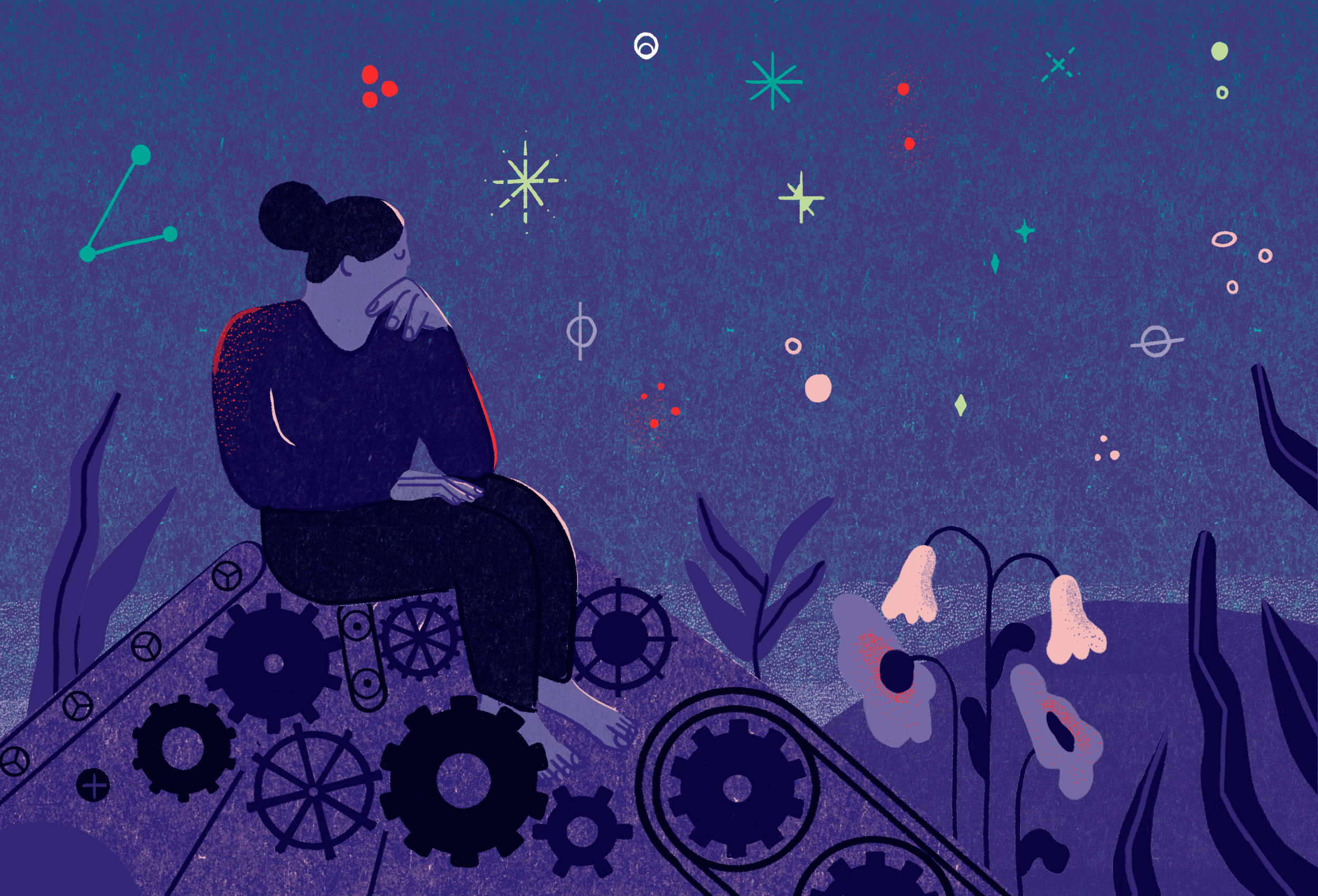Our brains aren’t computers and that’s a good thing
Illustration by Noemi Fabra.
by Serg Valencia
Our nonprofit generates funding in multiple ways, including through affiliate linking. When you purchase something through an affiliate link on this site, the price will be the same for you as always, but we may receive a small percentage of the cost.
Throughout my psychology studies, I often felt disenchanted by the prevailing and overly mechanistic view of the human mind. I began questioning why we modeled the mind after a machine when it predates the computer itself. Just as dissecting Andrea Bocelli’s vocal cords would fail to capture the essence of his spiritually uplifting recitals, approaching the brain as a mere information processor overlooks the depth of our emotions, the subtleties of our motivations, and the boundless potential for creativity. To my surprise, the cherished companions of my childhood — video games — became a pivotal force in my academic journey as an adult, helping me understand how the brain works, unlocking wellness benefits in my life, and providing research-based insights that revealed a world far more fascinating than a mere assembly of bits.
Of wires and wonder: demystifying the distinction between brains and machines
The brain-computer metaphor has a tremendous pull. We seem to want our brains to be like computers. Why? Because we understand computers. We created them. They process information, and so do we. Nevertheless, the differences are too striking to ignore. For example, the importance of the prefrontal cortex in cognition is widely acknowledged. However, its neural basis — in other words, how the machinery operates and how we have conscious control to move an arm — remains a mystery. Computers are not mysterious. Computers do not experience mixed emotions. Computers do not need to motivate themselves to do laundry. People do. We have ups and downs and generally try to make our lives meaningful. Video games, an unexpected technological ally, can help us understand why the brain is more than a sterile, emotionless data processor.
There are about 1.7 billion mobile gamers. The industry employs brilliant developers, talented designers, and gifted storytellers. Their objective might seem straightforward (making money by selling entertainment); however, by focusing on the pixels, we might unintentionally overlook the whole story.
Minecraft, for example, the second-bestselling video game of all time, is used to aid socialization in individuals with Autistic Spectrum Disorder, as research shows it helps for fostering social connectedness and collaboration. A 2022 study revealed that children gamers outshine non-gamers in response inhibition, critical for behavioral control, and working memory. Why does this happen? Research is ongoing, but studies pinpoint that games provide players with rich environments, crafted by artists and creative minds, that fuel vivid emotional and social experiences that enhance our cognitive functions by igniting intrinsic human qualities through activities we enjoy.
Noemi Fabra
Entertaining games with serious brain benefits
Computers do not engage in self-care, but we know better. If you feel in the mood to enhance your well-being, you can work on training your brain and have a good time doing it. Venture into World of Warcraft, where studies reveal that players cultivate greater self-confidence and self-efficacy through collaborative creation and the sense of being valued within a community. Fear not if role-playing games do not resonate with you. There are plenty of engaging games tailored for all kinds of folks.
For the wordsmiths among us, jumping into the Wordle bandwagon can be a healthy trend to follow. As the leader of a 2019 research study, Dr. Anne Corbett, who investigated the cognitive benefits of puzzles like Wordle and Sudoku, explains, “(Our) research supports previous findings that indicate regular use of word and number puzzles helps keep our brains working better for longer.”
Finally, a personal recommendation validated by science: Tetris. Though not a game designed with cognitive benefits in mind, researchers have shown its potential helpfulness in reducing intrusive thoughts, in some cases related to traumatic events, but also minor nuisances, like the thing we should have said at a meeting but didn’t or tomorrow’s looming dentist appointment.
Noemi Fabra
Ice cream and algorithms: cherishing human experiences
Our brains are not computers responding to external stimuli. Some days we want ice cream, others, we want to read a Tolstoy novel. Why does it matter if our brains are or are not machines? It matters because when we compare our faculties to those of machines, we diminish our humanity. We are the ones feeding machines with human experiences for them to work. AI tools, for example, are built on the work of humans. A writer crafted a compelling story based on her personal struggles. A developer built a model after years of trial and error. A content moderator chose the data to train the algorithm. These are real people making human choices. Video games and other activities with cognitive and mental health benefits highlight this aspect of ourselves. Just as we don’t need to understand how the auditory system works to have a pleasant conversation, we don’t need to grasp the neurological underpinnings of playing Sudoku to make our minds stronger. As we indulge in experiences only humans can relish, we shape our minds and actively elevate our well-being.
Unlike computers, we can savor simple joys, like practicing self-care or ice cream melting on our tongues during a sun-drenched summer afternoon.



